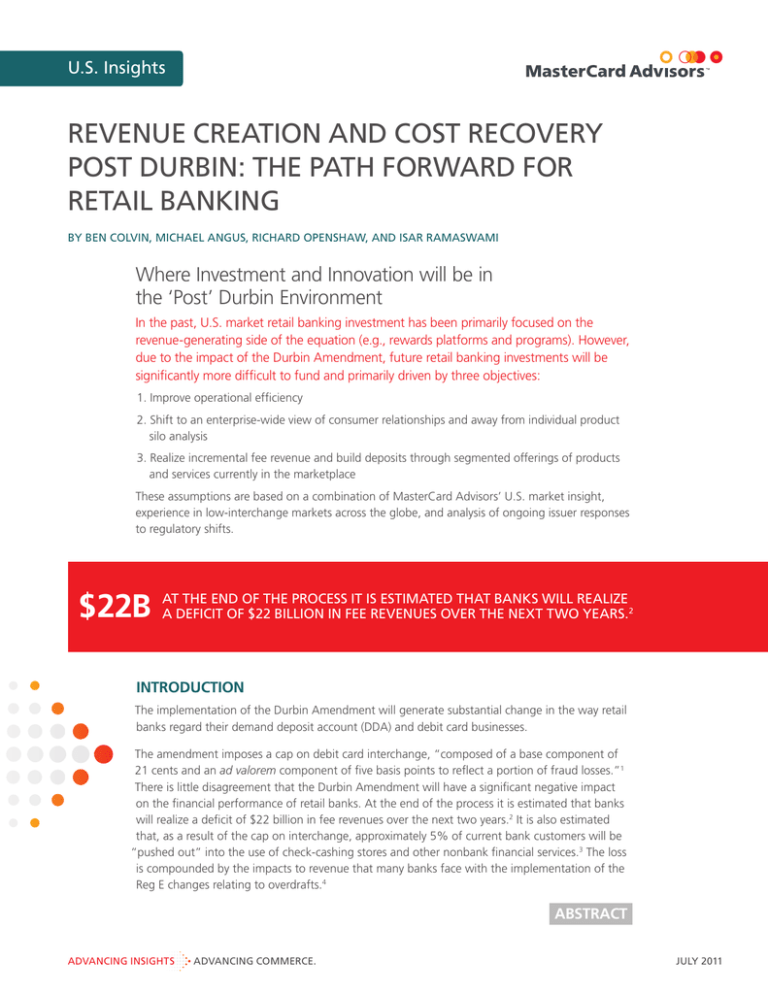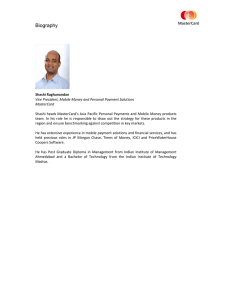
U.S. Insights
revenue creation and cost recovery
post durbin: the path forward for
retail banking
BY Ben Colvin, Michael Angus, Richard Openshaw, and Isar Ramaswami
Where Investment and Innovation will be in
the ‘Post’ Durbin Environment
In the past, U.S. market retail banking investment has been primarily focused on the
revenue-generating side of the equation (e.g., rewards platforms and programs). However,
due to the impact of the Durbin Amendment, future retail banking investments will be
significantly more difficult to fund and primarily driven by three objectives:
1. Improve operational efficiency
2. Shift to an enterprise-wide view of consumer relationships and away from individual product
silo analysis
3. Realize incremental fee revenue and build deposits through segmented offerings of products
and services currently in the marketplace
These assumptions are based on a combination of MasterCard Advisors’ U.S. market insight,
experience in low-interchange markets across the globe, and analysis of ongoing issuer responses
to regulatory shifts.
$22B
At the end of the process it is estimated that banks will realize
a deficit of $22 billion in fee revenues over the next two years.2
introduction
The implementation of the Durbin Amendment will generate substantial change in the way retail
banks regard their demand deposit account (DDA) and debit card businesses.
The amendment imposes a cap on debit card interchange, “composed of a base component of
21 cents and an ad valorem component of five basis points to reflect a portion of fraud losses.”1
There is little disagreement that the Durbin Amendment will have a significant negative impact
on the financial performance of retail banks. At the end of the process it is estimated that banks
will realize a deficit of $22 billion in fee revenues over the next two years.2 It is also estimated
that, as a result of the cap on interchange, approximately 5% of current bank customers will be
“pushed out” into the use of check-cashing stores and other nonbank financial services.3 The loss
is compounded by the impacts to revenue that many banks face with the implementation of the
Reg E changes relating to overdrafts.4
ABSTRACT
ADVANCING INSIGHTS
ADVANCING COMMERCE.
july 2011
U.S. Insights
For issuers in the U.S. to remain competitive despite this series of regulatory
challenges, they must continue to invest and foster evolution in their products
and service strategies. As observed in other low-interchange markets, despite
the lack of a compelling standalone business case, issuers have still found a role
for debit in the overall payments mix of the transaction account, disregarding
the isolated financial impact of debit products.
The way banks manage their P&L may be changed forever as the Durbin
Amendment drives banks to shift focus from primarily being on the revenue side
to a more balanced approach encompassing both revenue and cost. MasterCard’s
view is that this change in focus represents an opportunity not only to ensure
bottom-line results, but also to deliver better customer experience and value,
leading to greater customer loyalty. In other words, Durbin will force debit issuers
to redefine and refocus their efforts as they work to maximize efficiency and gain
an enterprise-level understanding of customers and relationships in order to survive.
To receive the full article, including details of the following sections, please
contact Ben Colvin at Ben_Colvin@MasterCard.com.
•
Reactions to the Durbin Amendment
are well under way
•
Investment in the retail banking space will shift
dramatically in focus
•
Process efficiency will be mandated
by the new regulation
•
Product evolution will move forward
at the enterprise level
•
Product evolution will be driven by a
convergence of customer demand for better
monetary value and regulatory pressure
Immediate path forward
In the short term, because of the lag time it will take for banks to implement
their near-term revenue replacement decisions, investment in debit may
indeed come to a standstill. However, in the background, what we believe is
also happening is the real work on the future, as banks begin to redefine and
refocus efforts to optimize P&L management in the harsh “new normal.” This
shift is occurring in two distinct categories: process efficiency and product
evolution.
The Durbin Amendment does not make a debit card less important but less
profitable. As it still remains every customer’s access tool to the checking
account, understanding the combined debit card and account usage patterns
will still be important in identifying the type of relationship—primary, secondary,
2
ADVANCING INSIGHTS
ADVANCING COMMERCE.
or even dormant; it will still represent the main gateway to understanding
product cross-hold; and it will still constitute the starting point in developing
cross-selling strategies aimed at increasing depth, length, and profitability of
any customer’s relationship. Success in the coming regulatory environment will
require shifting to an enterprise-level view of customers and operating based
on the insights provided by a view across individual product silos.
Competition among retail banks will be fierce as the Durbin Amendment creates
pressure on profitability. Evolving to perform effectively in this new environment
will be critical for retail banks as they redefine and refocus investments to continue
to compete despite the regulatory challenges they face.
endnotes
1Fed Text: Staff Propose Capping Debit Card Fees at 21 Cents, http://imarketnews.com/
node/32976
2
The Fed’s Final Debit Rules: http://www.pymnts.com/The-Fed-s-Final-Debit-Rules-DidAnyone-Win/
3Fed Text: Staff Propose Capping Debit Card Fees at 21 Cents, http://imarketnews.com/
node/32976
4
MasterCard Global Insights: “Innovative Strategies for Dealing with No Longer Profitable
Customers,” http://insights.mastercard.com/white-papers/innovative-strategies-for-dealingwith-no-longer-profitable-consumers-us/
Contributing Authors
Ben Colvin
Senior Vice President
Global Debit & Pre-Paid Knowledge Center, MasterCard Advisors
Ben_Colvin@MasterCard.com
Michael Angus
Senior Vice President
Emerging Payments & Payments Strategy Knowledge Center, MasterCard Advisors
Michael_Angus@MasterCard.com
Richard Openshaw
Senior Vice President
Global Risk & Operations Knowledge Center, MasterCard Advisors
Richard_Openshaw@MasterCard.com
Isar Ramaswami
Associate Analyst
MasterCard Advisors
Isar_Ramaswami@MasterCard.com
To receive the full article, contact Ben Colvin at Ben_Colvin@MasterCard.com.
For additional insights, please visit www.mastercardadvisors.com and insights.mastercard.com.
©2011 MasterCard. All rights reserved. Proprietary and Confidential.
Insights and recommendations are based on proprietary and third-party research, as well as MasterCard’s analysis
and opinions, and are presented for your information only.
ADVANCING INSIGHTS
ADVANCING COMMERCE.




